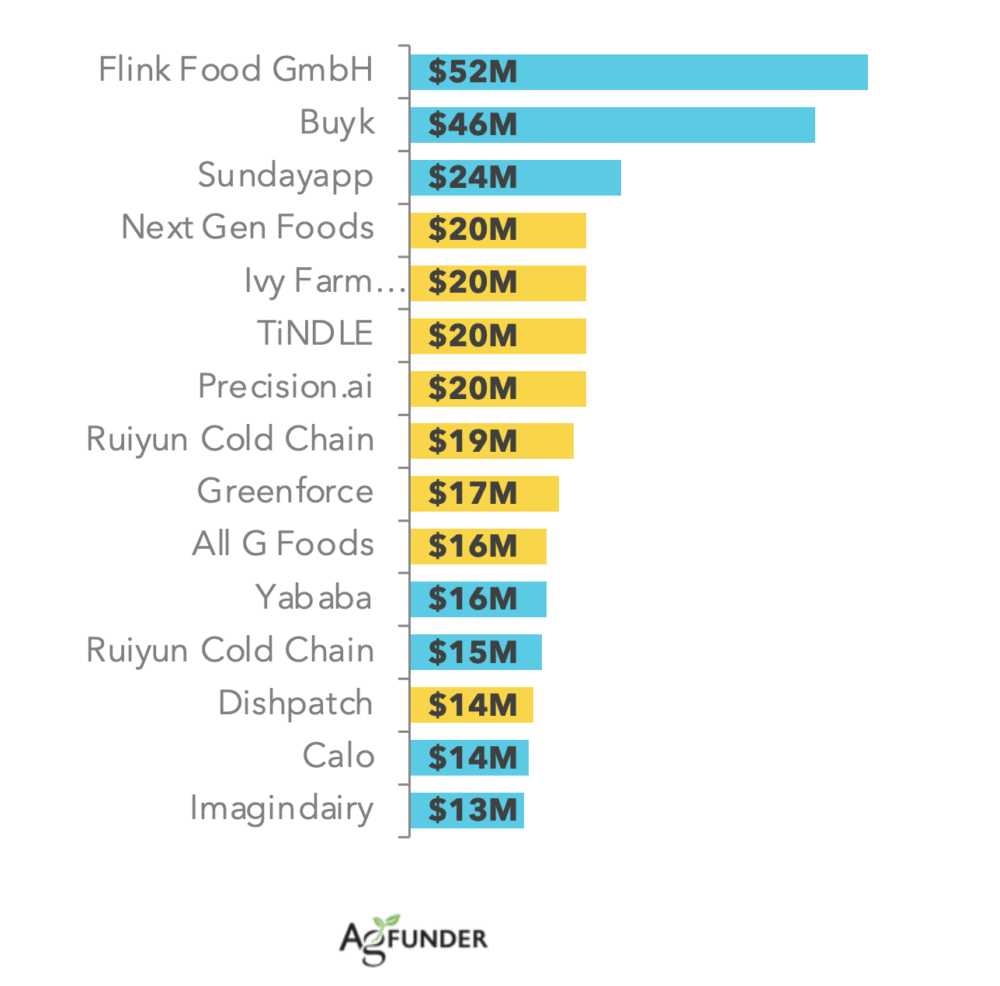Data Snapshot is a regular AFN feature analyzing agrifoodtech market investment data provided by our parent company, AgFunder.
Click here for more research from AgFunder and sign up to our newsletters to receive alerts about new research reports.
Fourteen companies raked in $326 million in seed-stage agrifoodtech deals in 2021, with the bulk of those startups operating in the eGrocery and alternative protein sectors, according to the 2021 AgFunder Agrifoodtech Investment Report.
By comparison, the top 15 seed-stage deals in 2020 netted $230 million and included a wider variety of companies including those in remote sensing and farm robotics.
The strong presence of eGrocery and alt-protein in 2021 seed deals reflects these sectors’ larger dominance over agrifoodtech investment during the year. Of the $51.7 billion agrifoodtech dollars raised last year, eGrocery gobbled up $18.5 billion and alternative proteins made up the bulk of the $4.8 billion in Innovative Foods investment.
Top seed deals for 2021
Flink Food’s total fundraising in 2021 epitomizes the pace of acceleration and froth for the eGrocery sector. The Germany-based company raised two seed rounds totaling a whopping $52 million then followed that up with sizable Series A and B rounds by the close of the year.
Buyk, a grocery delivery startup based in Chicago and New York, had the next-biggest seed round of the year, though business took a turn for the worse in 2022. (More on that below.) Another notable round came from Berlin’s Yababa, which specializes in deliveries of Turkish and Arabic foods.
Alternative protein companies, which make up a large part of AgFunder’s Innovative Foods category, were highly varied and included deals for plant-based meats (Singapore’s Next Gen Foods and its UK spinoff TiNDLE), cultivated meat (Ivy Farm Technologies), and animal-free dairy (Imagindairy).
Less optimism for eGrocery in 2022
Alternative protein’s future looks substantially brighter than eGrocery’s midway through 2022.
The bulk of eGrocery deals went to the so-called “instant” delivery startups that typically promise a selection of food and household items in under 15 minutes. Over the last couple months, some of the biggest companies in the space announced layoffs amid investor sentiment cooling and a larger tech downturn. One company, Russian-backed Buyk, filed for bankruptcy in March 2022 due to the war in Ukraine. Flink Foods, at least, has not announced any cuts or restructuring so far.
Alt-protein startups continue to bring in funding. For example, Imagindairy just raised a $15 million seed round extension and TiNDLE scored a $100 million Series A earlier this year.
Alt-protein and eGrocery are two distinctly different categories sitting in two different parts of the agrifood value chain. Even so, it’s not hard to understand why one continues to grow while the other rapidly cools off. In a world grappling with supply chain issues, war, climate change, and hunger, alternative proteins may provide an important part of the larger solution towards a secure, sustainable food system. By contrast, grocery delivery, especially in 15 minutes or less, is starting to look very frivolous.





